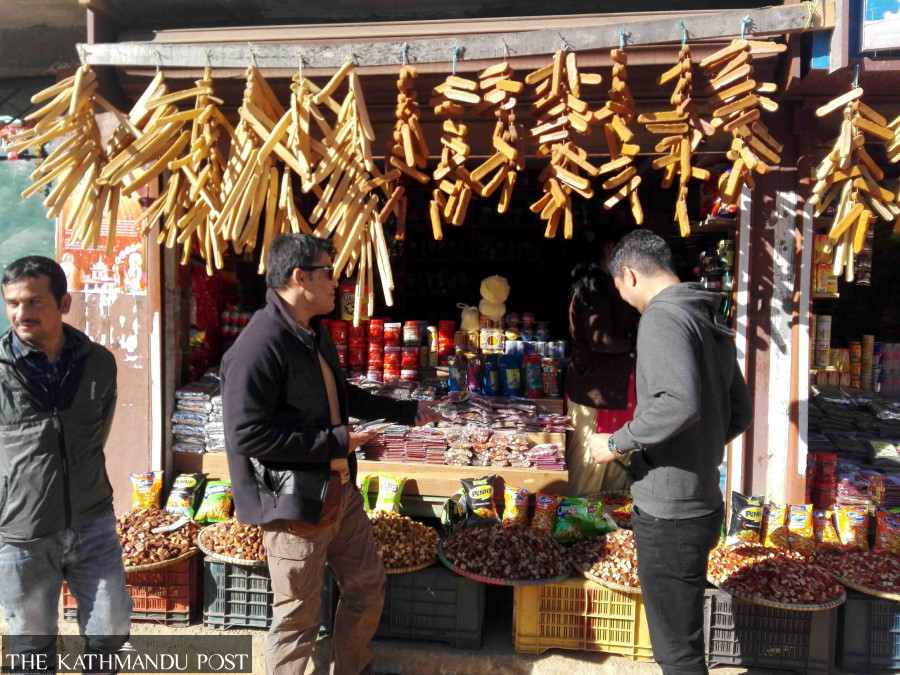Money
Dog chew export rises by 27.82 percent in first half
The United States was the largest importer, taking in 852 tonnes valued at Rs 1.59 billion, followed by Canada with 56 tonnes worth Rs130.34 million.
Post Report
Nepal's dog chew exports surged by 27.82 percent in the first half of the current fiscal year due to growing international demand.
According to the Department of Customs, Nepal exported 963 tonnes of dog chews worth Rs1.80 billion in the first six months of the fiscal year ending in mid-January.
The United States was the largest importer, taking in 852 tonnes valued at Rs 1.59 billion, followed by Canada with 56 tonnes worth Rs130.34 million.
The United Kingdom imported 11 tonnes valued at Rs30.35 million, while Japan received 8 tonnes worth Rs 18.52 million.
Manufacturers and exporters report that 90 percent of Nepal's dog chew production is exported, with only a small portion consumed locally by people. Due to the high cost, Nepalis generally do not feed these chews to their pets.
American and Canadian pet owners favour hard cheese-based chews made from yak milk. Most of these products originate from the eastern hill district of Ilam. Industry insiders attribute the rising demand in the US and Canada to increased pet ownership during the Covid lockdowns.
Nepali dog chews were also exported in significant quantities to Greece, Hong Kong, South Korea, Malaysia, the Netherlands, Singapore, Taiwan, and Ukraine during the review period.
“The number of dog chew exporters from Nepal is increasing to meet rising international demand, leading to higher exports. Currently, there are about 40-50 dog chew exporters,” said Rajendra Kumar Shrestha, founder of Manaram Group.
He added that the superior quality of Nepali dog chews compared to other products has contributed to this export growth.
Manaram Group, a leading pet food exporter, ships 100 tonnes of dog chews per month under the ‘Himalayan Dog Chew’ brand to the US market. These chews are manufactured at its plant in Godak, Ilam, before being reprocessed and packaged in the US for distribution, according to Shrestha.
Dog chews are highly preferred due to their nutritional value since they contain 60 percent protein, along with calcium and vitamins. The chews are made from 99 percent yak and cow milk, with additional ingredients like lime juice and salt used in production.
“We started exporting dog chews in 2007-2008 with just 800 kg annually. Since then, exports have grown exponentially,” Shrestha said. He noted that quality has also improved with technological advancements.
To meet increasing demand, Manaram Group signed an agreement on December 20 last year to receive 1,000 kg of raw cheese or whey daily, derived from 10,000 liters of milk, from the state-owned Dairy Development Corporation. The corporation has been supplying whey to the group from the Biratnagar Supply Scheme.
The group collects 6,000 liters of milk from nearby districts and manufactures dog chews at its Ilam plant. Since this supply is insufficient, the company also sources chews from small local dairy farmers in Dhankuta, Sankhuwasabha, Ilam, Panchthar, and Taplejung districts.
Shrestha expressed optimism about the future of Nepali dog chews, citing increasing demand in international markets.
Manufacturers highlight that Nepali dog chews made from Himalayan yak milk at high elevations are widely popular, but are expensive. The chews contain no added preservatives, colours, or chemicals and are manually produced using traditional techniques.
The production process involves boiling milk, separating the whey, shaping and drying the remaining curd, and then slicing it into sticks. The sticks are dried and smoked for a month, resulting in a fully natural and unique pet treat compared to other products on the market.
In July last year, Nepal’s quality watchdog proposed new standards for chhurpi, which also apply to dog chews, to align the product with international standards.
The proposed regulations cover production, processing, packaging, handling, storage, and transportation in accordance with the food purity guidelines set by the Ministry of Agriculture and Livestock Development.
With rising global demand and improvements in quality and production capacity, Nepal’s dog chew industry is poised for further expansion in the coming years.




 13.12°C Kathmandu
13.12°C Kathmandu












